By Vincent Otieno
Whether soaring majestically in the African skies, or greedily ripping and tearing through a carcass, vultures are some of the magnificent birds found in Africa. While vultures often viewed as sinister, signifying bad tidings, or even death, the vital role that vultures play in the environment is irreplaceable. Acting as nature’s own clean-up crew, these endangered birds remove carcasses, which when accumulated in the environment, would have a negative impact on environmental and human health.
However, these majestic birds are now faced with extinction, with some species for the continent seeing a decline of up to 97% over the last 50 years. Today, 7 out of 11 African vulture species are threatened with extinction due to various threats. Poisoning is the major cause of vulture mortalities accounting for more than 60% of vulture deaths on the continent. In some instances, poachers lace carcasses with poison to kill vultures, as they alert authorities of poaching activities. In other cases, vultures are killed unintentionally, when herders lace carcasses with poison to kill predators in retaliatory killings, and vultures die after feeding on these carcasses.
Poisoned dead vulture in Kenya © Munir Virani
Belief-based use is another threat facing vultures, where vultures’ parts are used in traditional medicine and believed to cure ailments or imbue partakers with magical powers or bring good luck. In addition, energy infrastructure is responsible for vulture deaths through collisions or electrocutions.
This International Vulture Awareness Day (IVAD), we highlight efforts by BirdLife and Partners to conserve vultures across the continent. In Eastern Africa, where poisoning electrocution and collision with energy infrastructure are major threats, BirdLife partners are implementing various conservation interventions. In Rwanda, Nature Rwanda has identified and updated key information on 15 key locations across Rwanda.
“To understand vulture population trends in Rwanda, we conducted research and identified 15 key vulture locations with the support of our Vulture Champions. Among these sites, Busaga Forest emerged as the only confirmed breeding site in Rwanda, highlighting the urgent need for targeted conservation efforts. We have initiated the process of applying for the management of this critical forest to protect the lives of these Critically Endangered birds”, notes Elie Sinayitutse, Head of Programmes at Nature Rwanda.
In Tanzania, Nature Tanzania is engaging local communities in the Makao Wildlife Management Area (WMA), with 181 local community members benefitting from a Community Revolving Fund. Through the CRF, the community members are engaged in environmentally sustainable businesses, which has safeguarded vultures, reducing harvesting vulture parts for belief-based use. Further, the community members are now vulture conservation ambassadors, assisting Nature Tanzania raise awareness about these endangered birds.

 CRF beneficiaries involved in sunflower farming © Nature Tanzania
CRF beneficiaries involved in sunflower farming © Nature Tanzania
“As the CRF reaches more people, our network of vulture conservation ambassadors is expanding in Makao WMA. Currently, the network is made up of 181 CRF beneficiaries, 31 Village Game Scouts and 56 Traditional Healers This growing network has enhanced our ability to spread awareness about vulture conservation in villages around Makao WMA. We are committed to including more individuals in our network by expanding the reach of CRF and engaging more traditional healers”, says Alpha Mflinge, Species Conservation Officer at Nature Tanzania.
In Kenya, Nature Kenya is working with local communities in Masai Mara region to raise awareness of the critical role vultures play in the ecosystem. Consequently, vulture volunteers (community vulture champions) are promptly reporting wildlife poisoning incidents, thus averting further vulture deaths.
Another critical aspect of these conservation interventions is building the capacity of local communities. Subsequently, more than 1200 community games scouts and rangers have been trained on Rapid Response Mechanisms (RRM) to reduce wildlife poisoning in Kenya and Tanzania. Additionally, targeted awareness campaigns carried out by BirdLife Partners in Ethiopia, Kenya, Tanzania and Uganda reached close to 200,000 people between 2023 to 2024.
In West Africa, belief-based use is the leading cause of vulture deaths. In April 2024, a coalition of organisations including BirdLife, the Convention on the Conservation of Migratory Species of Wild Animals (CMS) launched the West Africa Vulture Conservation Action Plan to address key threats faced by vultures in West Africa . The Plan targets actions to be carried out in 16 countries in the region, with a vision of ensuring that vulture populations achieve sustainable levels and are protected by effective legal frameworks by 2043.

 The West Africa Vulture Action Plan envisages sustainable vulture populations in the region by 2043
The West Africa Vulture Action Plan envisages sustainable vulture populations in the region by 2043
“In West Africa, the use of vultures in traditional practices poses a significant threat to their populations. The West Africa Vulture Conservation Action Plan aims to protect vultures through strong frameworks that promote their coexistence with people in a healthy environment. Central to this effort is our dedication to working with traditional healers to decrease the reliance on vultures for belief-based purposes”, says Joseph Onoja, Director General of the Nigerian Conservation Foundation (NCF).
Further, vulture surveys were conducted in Senegal, Sierra Leone and Gambia, to increase knowledge on vulture populations in the region. Market surveys for vulture parts were also conducted in Nigeria, Gambia and Senegal. BirdLife Partners including the Nigerian Conservation Foundation (NCF), Nature Communautés Développement (NCD), and other collaborating organizations namely Organização para Defesa e Desenvolvimento das Zonas Húmidas (ODZH), and West Africa Bird Study Association (WABSA) developed social marketing strategies to address belief-based killings of vultures.
In North Africa, BirdLife Partners are implementing direct actions addressing the threat of electrocution and collision with energy infrastructure. In Egypt, Nature Conservation Egypt (NCE) surveyed approximately 300 km of power lines and 25 km were fitted with bird flight diverters, reducing the risk of collisions and electrocution. In Morocco, BirdLife Partner GREPOM has developed an environmental education guide on pastoralism and birds. The guide is instrumental in increasing awareness and understanding of the local communities about the importance of birds especially vultures in their ecosystems and the role they play in maintaining ecological balance.
In Southern Africa, a study on the total economic value of ecosystem services provided by vultures was conducted in Botswana, Zambia and Zimbabwe. The study indicated that vultures provide significant ecosystem services including carcass disposal, pest control and cultural benefits. The findings of this study will be instrumental in advocating for stronger vulture conservation policies.

 Cape Vulture © Catchlight Lens_ Shutterstock
Cape Vulture © Catchlight Lens_ Shutterstock
“It is encouraging to see the collaborative efforts of BirdLife Partners, governments, and other stakeholders working together to save vultures in Africa. Community engagement is crucial to this mission, such as involving traditional healers in seeking plant-based alternatives to vulture parts in their practices“, concludes Fadzai Matsvimbo, Preventing Extinctions Programme Coordinator for Africa at BirdLife International.



